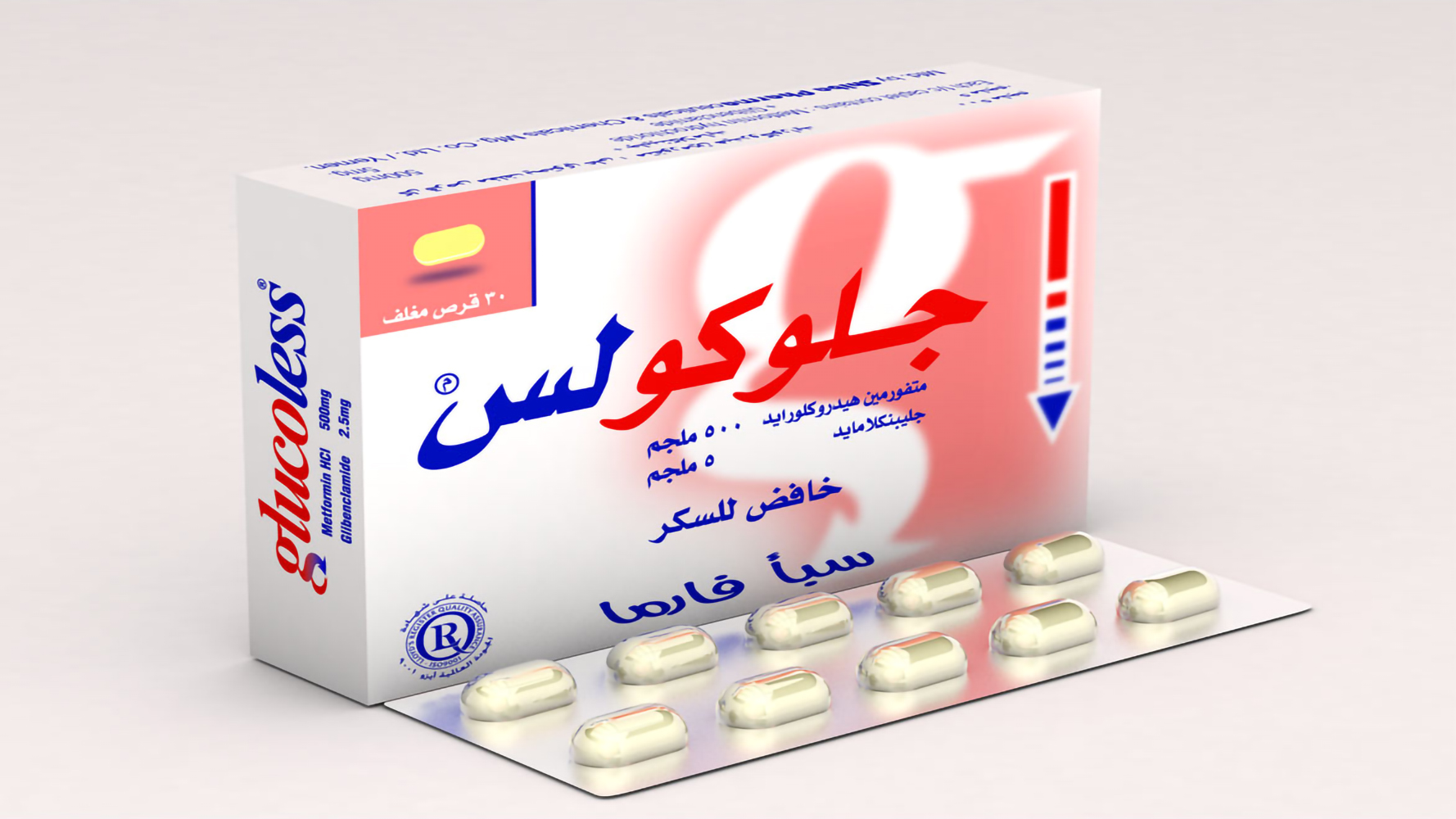Section :
Glucoless
COMPOSITION :
Each f/c tablet of Glucoless 2.5 mg /500 mg contain : Glibenclamide 2.5 mg
Metformin hydrochloride 500 mg
Each f/c tablet of Glucoless 5 mg /500 mg contain : Glibenclamide 5 mg
Metformin hydrochloride 500 mg
DESCRIPTION :
Glucoless is a combination of two active materials:
Metformin is a biguanide antidiabetic agent, lowering basal and postprandial plasma glucose. It reduce
hepatic glucose production and increasing insulin sensitivity in muscle, improving peripheral glucose
uptake also slowing intestinal glucose absorption.
Glibenclamide is one of the second generation sulfonylureas cause a rapid reduction of blood sugar
levels by stimulating release of insulin from the pancreas and increasing isulin binding receptor density
in periphral tissues.
After oral administration of Glucoless Metformin hydrochloride reach the maximum concentration
approximately after 2.5 hours and glibenclamide after 4 hours. Metformin plasma protein binding is
negligible while Glibenclamide is extensively bound to plasma albumin (99%). Metformin is excreted
unchanged by the urine with elimination half-life approximately is 6.5 hours while Glibenclamide is
completely metabolised in the liver into 2 metabolites and excreted in the bile (60%) and urine (40%)
with elimination half-life is 4 to 11 hours.
INIDICATION :
Treatment of type 2 diabetes ( insulin indenpendent ) in adults, as replacement for previous combination
therapy of metformin and glibenclamide in patients whose glycaemia is stable and well-controlled.
DOSAGE AND ADMINISTRATION :
- Initial dose should not exceed the daily dose of metformin and glibenclaminde that already being taken.
- The daily dose prefere to be adjust every two weeks or more according to blood glucose test by not
more than one tablet of Glucoless 5mg /500mg.
- Maximam daily dose is 2000 mg of metformine and 20 mg of glibenclaminde.
- Elderly patient the initial dose is one tablet of Glucoless 2.5mg / 500mg than the dose should be adjust
depend on renal function test.
RESTRICTION ON USE
Contraindications
- Hypersensitivity to metformin, glibenclamide, or other sulfonylureas and sulfonamides.
- Type 1 diabetes (insulin dependent diabetes), ketoacidosis, diabetic pre-coma
- Renal failure or renal dysfunction (serum creatinine > 135μmol / l in men and >110μmol/L in women).
- Dehydration, severe infection, shock, intravenous administration of iodinated contrast agents,
cardio-respiratory failure or myocardial infarction.
- Hepatic insufficiency.
- Children and patients with porphyria.
Precaution
- The treatment of Glucoless should be stopped immediately and consult the doctor ,if lactic acidosis
symptoms appear which include vomiting, abdominal pain with muscle cramps ,fatigue and difficulty in
breathing, this case occurs due to Metformin accumulation especially in patients with renal impairment.
- During treatment signs of sudden hypoglycemia may occure like cold sweat cold and pale skin,
dizziness, headache, repaid heartbeat feeling sick, starving and nervous in this case treatment should be
stopped and glucose or any food contain suger or honey should be taken in immediatly and tell the
doctor directly.
- Taken Glucoless should be stopped before 48 hours before major surgey or X-ray examination
invalving injection of an iodinal contrast medicine then return to treatment after 48 hours of finishing
after insurring of kidney function.
- Before starting using Glucoless renal function test should be established and during treatment renal
funtion test should should be done periodic.
Use during Pregnancy and Lactation
Pregnant, planning to get pregnant or breast-feeding women should not take this medicine because it
may harm the baby.
Effects on ability to drive and use machines
Glibenclaminde cause hypoglycemia so, should not be taken during drive or use machine.
DRUGE INTERACTION
Glucoless should not be used synchronized with : Miconazole, Phenylbutazone, With all antidiabetic
drugs, Danazol, Chlorpromazine, Corticosteroids (glucocorticoids and tetracosactides) NSAID,
Diuretics, Beta-blockers, Salbutamol, Fluconazole, Angiotensin Converting Enzyme inhibitors
(captopril, enalapril), Clarithromycin, Erythromycin, and Terbutaline.
ADVERSE EFFECTS :
Metformin :
- The common adverse effects : nausea, vomiting, diarrhea, abdominal pain, loss of appetite and
Metallic taste in the mouth.
- The rare adverse effects : Lactic acidosis, pruritus, urticaria, hepatitis or liver function test
abnormalities resolving upon metformin discontinuation and decrease vit. B12 absorption and serum
level during long-term.
Glibenclamide :
Hypoglycemia, temporary vision disturbances, nausea, vomiting, diarrhea, stomach discomfort, hives,
itching, skin rash possibly leading to symptoms such as breathlessness and even shock, allergic
vasculitis, abnormal laboratory values for liver and kidney tests and blood cells, jaundice, hepatitis,
porphyria, feeling hot and redness.
OVERDOSE :
Metformin : A large overdose may lead to lactic acidosis . Which considered as a serious and
emergency case should be treated in the hospital. The most effective treatment is to remove lactate and
metformin by hemodialysis.
Glibenclamide : may lead to severe life threatening hypoglycemia, the patient must immediately take
sugar. In case of unconsciousness , an intravenous injection of concentrated glucose solution is
indicated ( for adults starting with 40 ml of 20% solution ).
STORAGE INSTRUCTIONS :
Store below 30OC, in a dry place.
PRESENTATION :
Glucoless 2.5 mg /500 mg Tablet : Pack of 30 tablets and hospital packs of different sizes.
Glucoless 5 mg /500 mg Tablet : Pack of 30 tablets and hospital packs of different sizes.


